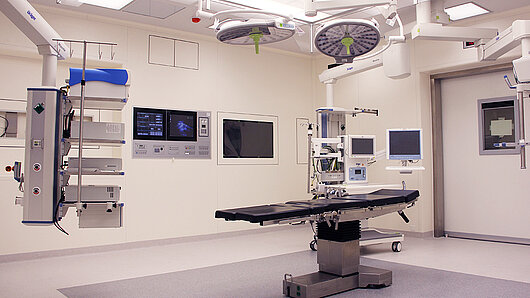High-Performance Computing Center Stuttgart

To explore these opportunities, the High-Performance Computing Center Stuttgart (HLRS) has launched a new Medical Solution Center called CASE4Med (Computer Aided Solution Engineering for Medical). With the support of a five-year grant from the Baden-Württemberg Ministry for Science, Research and the Arts, HLRS — in cooperation with the Innovation and Research Center Tuttlingen of Furtwangen University and SICOS BW GmbH — will build on a model that HLRS has implemented in the past to provide industry-specific HPC solutions. Through the Medical Solution Center, HLRS and its partners will explore how HPC could provide the highest benefit to medical technology companies.
CASE4Med is based on a concept first implemented in 2008, when HLRS cofounded the Automotive Solution Center for Simulation. This nonprofit organization brings car manufacturers, software developers, hardware manufacturers, and other stakeholders together in a precompetitive format to develop new methods that improve automobile development industry-wide. The Solution Center model was also adapted in 2018 with the founding of the Media Solution Center Baden-Württemberg, which is facilitating new forms of artistic production by connecting cultural and media organizations from across Europe with supercomputing resources and expertise at HLRS.
The new medical solution center CASE4Med will build a network that includes stakeholders from Baden-Württemberg's medical technology community and experts in the development of IT-based and data-driven approaches for medical applications. Through meetings and other outreach activities, participants will determine what kinds of HPC-based solutions could most benefit the community and what resources and skills would be necessary to make them a reality. By cultivating contacts and completing pilot projects demonstrating relevant applications of simulation, data analytics, and artificial intelligence, the medical solution center aims to grow steadily and to become a self-sustaining membership organization by the end of the grant period.
Prof. Dr.-Ing. Martin Haimerl, Scientific Director of the Innovation and Research Center Tuttlingen, has worked closely with the local medical technology community and foresees great potential in the Medical Solution Center. "In the medical technology sector, use of simulation and high-performance computing is uncommon and will need to be built up in a systematic way," he explained. "A change in mindset is needed to move away from hardware-oriented ways of thinking towards an openness to and familiarity with the use of supercomputing, including machine learning and data-driven approaches. The collaborative network that CASE4Med plans to build could take medical technology across the state to a new level."
The medical solution center will also profit from the expertise of SICOS BW, a nonprofit organization cofounded by the University of Stuttgart and the Karlsruhe Institute of Technology that facilitates access to high-performance computing for small and medium-sized companies. "We are looking forward to sharing our experience in developing solution centers. The medical field is challenging and promising at the same time, and we see great potential for the companies to make beneficial use of HPC and data analytics!” Dr. Andreas Wierse, managing director of SICOS BW GmbH, noted happily.
As in other engineering fields, simulation could offer medical device companies tools that make the development and testing of new products faster and less expensive. Simulation could be used, for example, to assess the suitability of materials or components for medical instruments and implants. It could help optimize the design of electronic and software components in medical instruments, evaluate the effectiveness of production, improve quality control processes, and extend devices' lifetime performance. In many cases, simulation could be used before fabrication and clinical application, saving the costs and delays that can result from multiple production and testing cycles.
The project partners also anticipate exploring new applications of systematic data collection and analysis. The approach could provide insights into production or quality control processes, for example, or support data-driven processes for the development of new products or business models. Such methods could revolutionize the way medical procedures are implemented and controlled.
One additional important use of HPC could be in helping medical technology companies to address Medical Device Regulation (MDR) requirements. Before a new medical device or therapy can be used in patients, companies must demonstrate that it is safe and effective, a process that is typically complicated and expensive. Although simulation and other data-based approaches alone are unlikely to eliminate the need for actual clinical trials, they can help to provide earlier insights and stronger evidence about a medical product's quality and benefit for patients.
HLRS Director Prof.-Dr. Michael Resch welcomed the beginning of the Medical Solution Center CASE4Med, saying, "Since its founding, a key component of HLRS's activities includes supporting the small and medium-sized enterprises that play such an important role Baden-Württemberg's economy. We are very excited for this chance to become more engaged with what is a new community for us, especially because the outcomes of this collaboration could demonstrate new ways in which high-performance computing can help to improve human health."
— Christopher Williams
Visit the CASE4Med website for more information.
A version of this article originally appeared in the Spring 2022 issue of InSiDE Magazine.